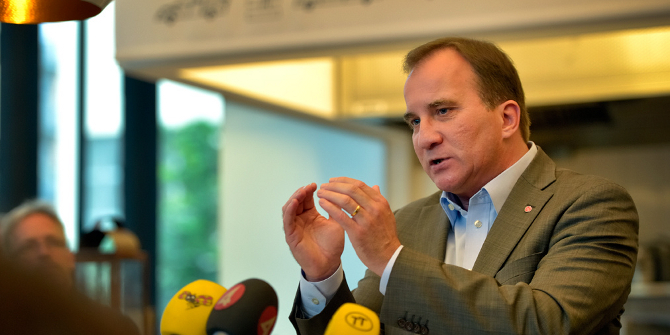 Despite initial fears of Euroscepticism on the continent after the election , the coalition government’s relationship with Europe has on the whole, been productive. Paul Adamson argues that while the government’s more recent policy of relatively pragmatic disengagement initially signaled an end to the ‘European honeymoon’, the fiscal crisis and events in Libya may yet see a stronger leadership role for the UK in Europe.
Despite initial fears of Euroscepticism on the continent after the election , the coalition government’s relationship with Europe has on the whole, been productive. Paul Adamson argues that while the government’s more recent policy of relatively pragmatic disengagement initially signaled an end to the ‘European honeymoon’, the fiscal crisis and events in Libya may yet see a stronger leadership role for the UK in Europe.
When the coalition government took office it was well aware that its EU partners viewed the inconclusive election outcome with some trepidation – even anxiety in some capitals. The omens were not promising given the Conservative party’s relations with the EU when Margaret Thatcher and then John Major were Prime Minister. And the unabashed anti-European rhetoric in its election campaign calling for “repatriation” to the UK of key EU policies in areas such as employment and fisheries gave further proof, if that were needed, of the Conservative Party’s conditional commitment to the EU.
The influence also of the stoutly pro-European but junior coalition partner Liberal Democrat party on the new government’s dealings with the EU was also unclear. Again, the omens were not promising when the coalition agreement thrashed out over a few days specifically ruled out, for example, the UK joining the euro in the lifetime of the current parliament. And the proposing of the so-called “sovereignty bill” stipulating that any proposed further accretion of powers to Brussels away from the UK would be subject to referendum made this Europe-wide nervousness all the more entrenched.
In its first few months of dealing with Brussels however, the coalition government have behaved like well brought up house guests, dispensing bonhomie to their European partners, doing their homework, attending all the meetings and making useful contributions to debates. No doubt mindful of the need for some discreet diplomacy of its own in making new allies, if not exactly friends, the government has highlighted that British pragmatism would be the order of the day. The UK has never had a romantic or idealistic view on Europe (and even the pro-European Foreign Office inelegantly refers at times to the EU as a “delivery vehicle”) but this no longer disturbs its European partners. Indeed, a growing number of Member States taking note of national opinion polls and the pressing need to get out of the economic crisis as quickly as possibly, are joining the UK in expecting the EU to give ”value for money” and be a contributor rather than an impediment to economic growth. So what was once seen as a uniquely UK stance is now mainstream.
But after a while, even the best brought up house guests cannot always be well behaved and there are clear signs of the honeymoon now coming to an end. On one perennial issue, the EU budget, the UK is acting true to form. To some European partners, the UK’s resistance to a larger increase in the annual budget (as demanded by the European Commission and supported by the European Parliament) is an unambiguous sign that the leopard has not changed its spots. The fact that many other Member States – and certainly all the net contributors – take the same view seems not to alter the conventional wisdom in many other Member States that the UK is at best a lukewarm European partner.
This in itself is not a sufficient reason to question the government’s commitment to its EU membership. But a newer debate, the future of the euro and its governance, does cast the UK in a particular, rather unflattering light. On the one hand, the British Prime Minister claims (some would say quite logically) that any bail-outs of Eurozone economies in distress should be paid for by fellow Eurozone members. On the other, largely at the instigation of the French President, Nicolas Sarkozy, pioneering steps are now being seriously pursued which would (some would say quite logically) dictate the future governance of the Euro. From this, it is a slippery slope towards excluding the UK – and other non Eurozone Member States, of course – from participation in key agenda setting decisions.
Until now at least this state of affairs does not seem to concern the Conservative Party one little jot, although there are signs that the Liberal Democrats are starting to express concern. Indeed, it is as if the EU is following a script written by the Prime Minister and his advisors. Mindful of its reputation in the past of obstructing, if not blocking, European integration and cooperation, its 21st century approach to EU membership seems to be benevolent disengagement wishing the rest of the EU well as it embarks on new areas of common and concerted action.
Such an approach may well be ascribed to self-interested pragmatism but it also goes with the grain of the EU’s future development as it grows in size and ambition: with 27 Member States (and several more waiting to join) a “multi-speed” Europe where each country opts in or out on any initiative, whether it be border controls, defence cooperation or an EU patent, is realpolitik at its clearest. But does such “realism” have any downsides for the UK in its relations with its European partners? We seem to be back in that all too familiar scenario of other countries, and not only Member States, wishing that the UK was helping more to shape and lead the EU rather than witnessing this gradual drift into disinterest and disengagement.
There is no denying that successive UK governments of all political colours have exasperated the rest of the EU, but the rest of the EU also acknowledges that the UK has helped introduce into the EU mindset the need for more open markets and greater competitiveness, and this long before the current economic crisis. And it is precisely because of this economic crisis, with the need to open markets – whether in energy, the digital economy or services – and to avoid protectionism, that so many outside the UK are urging it to return to a leadership role in championing the single market and improving Europe’s competitiveness.
But there is now a new imperative that will not only challenge the UK’s commitment to the EU but also force it to see its membership in a new light. That imperative is Europe’s response to the current upheaval in the Middle East and North Africa. Like many large Member States, the UK has always been ambiguous to say the least about the role the EU should play in foreign and security policy. Notwithstanding the new arrangements in this area under the Lisbon Treaty giving on paper at least the EU a single voice (that of the High Representative for Foreign and Security policy) and a new apparatus to underpin it, the so-called European External Action Service, the UK is still coming to terms with these new rules of engagement.
Despite criticisms of making foreign policy on the hoof (or being on the back foot if you prefer), events in the Arab world now unfolding have significantly pushed both David Cameron and his Liberal Democrat Deputy Nick Clegg, to leave their relative neglect of EU affairs and assert not just that the UK, but also the European Union, has to shoulder its responsibilities. For the two leaders, this ranges from urging fellow leaders to countenance military deployment in Libya, to offering humanitarian assistance and democracy building expertise to those countries which would welcome it.
The momentous events in our near neighbourhood, coupled with the need for the EU to play a critical role in this region as it rebuilds its future, challenges the coalition government to revisit its engagement with the EU. Its European partners wait anxiously to see how it responds to this challenge.
Please read our comments policy before posting.
This article first appeared in the The Foreign Policy Centre and European Commission Representation report The new British politics and Europe: Conflict or cooperation?.







A different position from the European governments should always be as a second plan done. I mention this, since the Middle East, is always a place where USA is always comming to sett the peace, but instead doing this, they come to update secondary plans as well. I am saying this because each time, when USA got into Middle East, it was about petrol big reserves. And if big European countries, don’t want to accept, this is affecting very much the costs of Europe when it comes to different consumers.